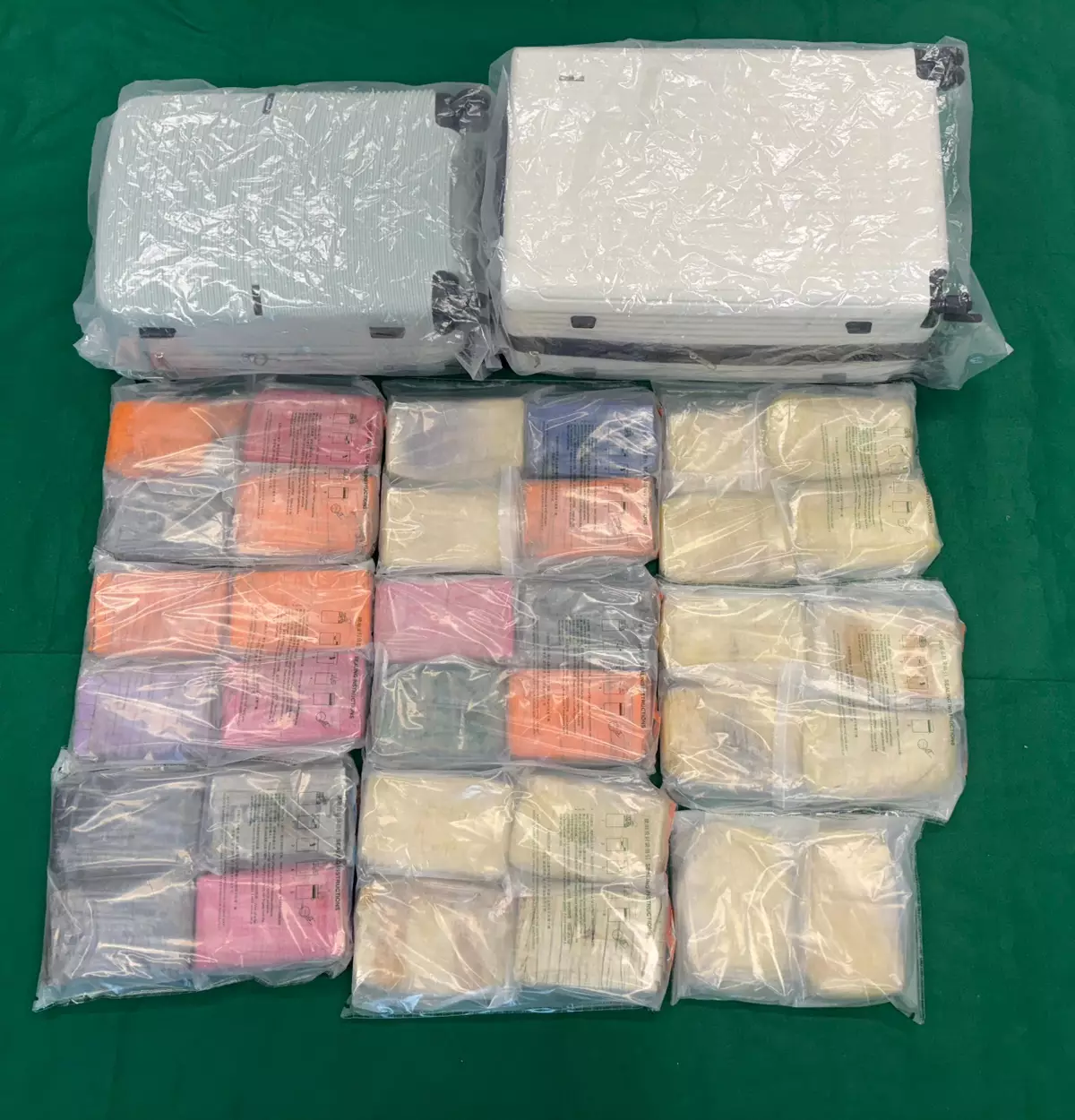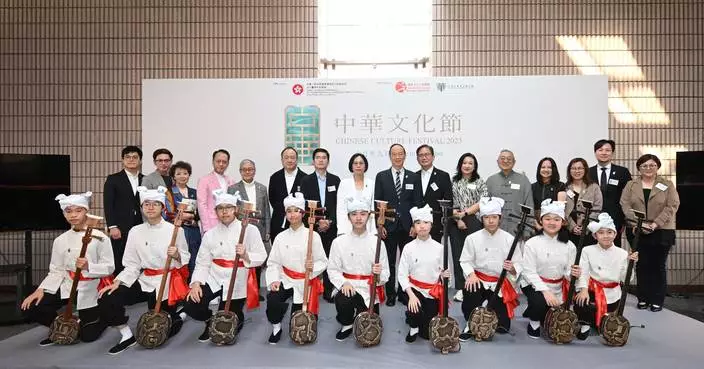Hong Kong Customs seizes suspected cocaine worth about $29 million
Hong Kong Customs yesterday (April 2) seized about 34 kilograms of suspected cocaine from storage in Hung Hom, with an estimated market value of about $29 million. A 23-year-old man was arrested.
During an anti-narcotics operation conducted in Hung Hom yesterday afternoon, Customs officers intercepted a suspicious man in a hotel and seized about 2kg of suspected cocaine inside a plastic bag carried by him. The man was subsequently arrested. Customs officers later escorted him to the hotel room for a search and further seized about 32kg of suspected cocaine.
An investigation is ongoing.
Under the Dangerous Drugs Ordinance, trafficking in a dangerous drug is a serious offence. The maximum penalty upon conviction is a fine of $5 million and life imprisonment.
Members of the public may report any suspected drug trafficking activities to Customs' 24-hour hotline 182 8080 or its dedicated crime-reporting email account (crimereport@customs.gov.hk) or online form (eform.cefs.gov.hk/form/ced002).

Hong Kong Customs seizes suspected cocaine worth about $29 million Source: HKSAR Government Press Releases
Public urged to show concern for maternal and child health to echo World Health Day
The Department of Health (DH) today (April 7) called on the public to echo World Health Day and work together to safeguard maternal and newborn health and reduce the number of preventable maternal and newborn deaths, by supporting breastfeeding, receiving timely immunisations as well as maternal and child health services.
April 7 each year marks the celebration of World Health Day by the World Health Organization. The theme this year is "Healthy beginnings, hopeful futures", with a focus on maternal and child health. Hong Kong has the longest life expectancy and one of the lowest infant and maternal mortality rates in the world. In 2023, the infant mortality rate was 1.6 per 1 000 live births, and the maternal mortality rate was three per 100 000 live births. These impressive statistics hinge on a public healthcare system that provides comprehensive health and medical services, including quality maternal and child health services, comprehensive obstetric and woman health services, and efforts in promoting breastfeeding.
(1) Quality maternal and child health service
The DH is the Government's health agency committed to promoting and safeguarding maternal and child health. Its Maternal and Child Health Centres (MCHCs) provide a wide range of comprehensive health promotion and disease prevention services for infants, young children and women, including an antenatal shared-care programme with the Hospital Authority (HA) to provide care for pregnant women throughout their pregnancies and deliveries, and immunisation services against 11 infectious diseases for eligible infants and young children. Currently, the overall coverage rate for relevant vaccines among locally born infants and young children is maintained at a high level of above 98 per cent.
Moreover, the DH also joins hands with parents and carers to continuously monitor children's health, growth and development. In addition to providing individual counselling, the DH also disseminates childcare and parenting information through social media, public talks and workshops for parents, to equip parents with childcare knowledge and skills and to safeguard children's health.
It was announced in "The Chief Executive's 2024 Policy Address" that the DH will revamp maternal and child health and family-planning services to strengthen pre-pregnancy counselling and parental education and promote healthy fertility. These include providing medical checkups, blood tests and other investigations, advice on diet and nutrition and lifestyle during pregnancy planning for women with a view to aligning with the Government's policy of encouraging and promoting healthy fertility. The DH will launch a series of promotional activities in the second quarter of this year to further promote maternal and child health.
(2) Comprehensive obstetric and woman health service
The obstetrics and gynaecology departments of eight hospitals under the HA provide a full range of obstetric and gynaecological specialist services, such as antenatal care, high-risk pregnancy management, gynaecological treatment, and assisted reproduction. To cope with the rising number of pregnancies with advanced maternal age and the increasing complexity of obstetric cases, the HA set up special care beds for pregnant women in maternity wards in 2018 and provided professional training for nursing staff in handling high-risk pregnancies. Advanced technology is also utilised in gynaecological treatment and prenatal diagnosis to enhance foetal health monitoring.
The Primary Healthcare Commission has been promoting the Life Course Preventive Care Plan through District Health Centres/Expresses and family doctors by developing personalised health strategies for people at different life stages, including guidance on healthy lifestyles (for example the benefits of breastfeeding), information and education on vaccinations, and screenings for chronic diseases and cancers.
(3) Promoting and supporting breastfeeding
The Government has long been promoting breastfeeding. Breast milk is the most natural source of food for babies, containing easily digestible and absorbable proteins as well as various antibodies and immunoglobulins that help enhance the immunity of babies and reduce their chances of infections. Research also shows that babies fed breast milk are less prone to conditions such as obesity and diabetes after growing up.
The Government set up a cross-sector Committee on Promotion of Breastfeeding in 2014 to provide specific recommendations on strategies and action plans to strengthen the promotion, protection and support for breastfeeding, to enhance the sustainability of breastfeeding and promote breastfeeding as a norm for baby care widely accepted by the general public. Moreover, the Government has set up a working group under the committee to enhance and reinforce breastfeeding-friendly measures at public and private hospitals with obstetrics departments.
At present, eight MCHCs have been accredited as Baby-Friendly Health Facilities. In addition, eight public hospitals under the HA with obstetrics departments and one private hospital were accredited as Baby-Friendly Hospitals. Accredited organisations are required to formulate infant feeding policies and action plans, provide relevant training for their staff and monitor the implementation of breastfeeding support measures on an ongoing basis.
The Hong Kong Breast Milk Bank at Hong Kong Children's Hospital commenced operations in January this year. As of March, over 300 litres of breast milk have been collected and distributed to all public hospitals with neonatal intensive care units, with priority given to preterm babies or babies with serious illnesses. The establishment of the first local breast milk bank marks an important milestone in neonatal healthcare services, demonstrating the commitment of the Government and the community to nurturing life and building a support network for mothers and babies.
For more information on maternal and child health, members of the public may visit the DH's Family Health Service website (www.fhs.gov.hk/english).














































